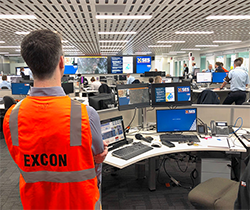Testing the waters vital for EPA's real-time response
When catastrophic events like the bushfires hit NSW, it is vital that the EPA’s collaboration with other agencies is seamless. To be ready for the call, the EPA’s Emergency Response teams train regularly.

Simulated training exercises help the EPA and emergency services co-ordinate and prepare for catastrophic events
When catastrophic events like the bushfires hit NSW, it is vital that the EPA’s collaboration with other agencies is seamless. To be ready for the call, the EPA’s Emergency Response teams train regularly.
The emergency response and recovery skills needed by key agencies in NSW are transferable across all crises from fires to floods.
Simulation exercises based on real data and risk assessments enable EPA staff to rehearse the emergency response to such events, helping to improve collaboration and maintain best practice.
EPA staff participated in last year’s state-level simulation Exercise Derrubin which tested agency preparedness in the hypothetical scenario of a catastrophic flood event in the Hawkesbury Nepean river system. They worked alongside the State Emergency Service (SES), NSW Police, Fire and Rescue NSW and other government agencies who support emergency management.
The head of EPA’s Special Services Unit Jane Burgett told EPA Connect that the exercise had three phases: 1 Response, 2 Mass evacuation and 3 Recovery.
“Each phase was conducted a week apart and EPA staff were involved in the development of the overall exercise as well as playing key roles during Phases 1 and 3,” Jane said.
“We identified licensed and other facilities that would be threatened by a catastrophic flooding event and environmental hazards that might pose risks for rescue and evacuation operations.
During the Recovery phase the EPA identified and assessed the quantities and types of waste generated by the flood and during recovery – and implemented strategies to manage this waste.
“We also identified strategies to ensure clean-up activities did not further harm the environment,” Jane added.
The experience gained in these simulated exercises has been extremely helpful during the bushfire crisis.”

